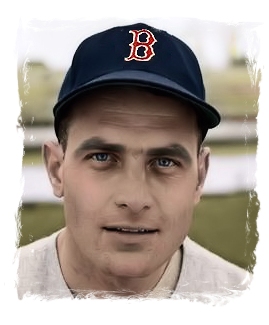 |
Bud Byerly was born on October 26, 1920 in Webster Groves, Missouri. He attended the Goodall School followed by four years at Webster Groves High School. It was his high school coach who helped him get into professional baseball. His high school coach took him to Sportsman Park for a try out with the Cardinals and he was signed to a contract. When he graduated from Webster Groves High in 1939 he had his first pro season in 1940 for the Portsmouth (Ohio) Red Birds in the Class-C Middle Atlantic League. He improved considerably in Class-B ball (the Three-I League), pitching for the Decatur (Illinois) Commodores. In 1942, it was the Texas League, pitching for the Houston Buffaloes, he continued improvement in ERA, lowering it to 2.77. When the United States entered World War II, he was, for some unknown reason, declared 4-F and exempt from military service. In 1943, though saddled with a won/loss record of 9-21 for the last-place Sacramento Solons, he improved his earned run average to 2.49. He got the call up in September and had his major-league debut on September 26th in the second game of a doubleheader against the visiting Philadelphia Phillies. He did not appear in the 1943 World Series, won by the New York Yankees in five games. He spent most of 1944 with the International Leagueís Rochester Red Wings, joining them in late April. He was called back to join the big-league club in July, but it was more than a month before he saw game action. The Cardinals had returned to the World Series, this time against the St. Louis Browns. Both teams shared Sportsmanís Park, so the entire Series was played in one ballpark. Byerly only appeared in Game Three, pitching the last inning-and-a-third of a game the Browns won, 6-2. In 1945, Byerly spent the full season in St. Louis, appearing in 33 games for the Cardinals. Eight of them were starts, the rest in relief. With considerable numbers of big-league players returning from military service, Bud spent the next four years playing minor-league ball. During these off-seasons, throughout, he worked for Railway Express. In February 1946, Rochester acquired him from the Cardinals. It was Rochester again in 1947, and the following year, he was dropped a level, going down the ladder instead of up, from Triple-A Rochester to the Double-A Texas League. He began the season with Houston, but he was released outright in May and signed with the Tulsa Oilers, a Cincinnati Reds farm team. In 1949, he was able to edge back up into Triple A. He started the season with Tulsa and wasnít having a good year, but then he caught a break and was traded to the Syracuse Chiefs of the Triple-A International League. He had another good stretch for Syracuse in 1950 and earned himself a call up to Cincinnati in September, but he didnít pitch much. Byerly spent all of 1951 with Cincinnati, and pitched well. Two bad outings sank him in 1952. He opened the season with the Reds but in June was traded to the Dodgers, who placed him with the St. Paul Saints. There was another transition in 1953, as he began the year in St. Paul, but then was soon traded by the Dodgers to the New York Giants. The Giants had him play on the other side of the Mississippi River in the Twin Cities, pitching for the Minneapolis Millers. In 1954 and 1955, he played two full seasons for the Millers. He next became part of the Washington Senators system, obtained from Minneapolis shortly before the season opened, and he began the season with their Triple-A club, the Louisville Colonels. In June, Washington purchased his contract from the Colonels. He did contribute well for the Senators, pitching in 25 games with a 2.96 ERA and had another good year in 1957, working in 47 games, closing 33 of them. In 1958, he had two differing experiences, pitching in 17 games for the Senators and then in 18 games for the Boston Red Sox with a 1.78 ERA. He came to the Red Sox via trade on June 24th, with the Sox sending left-hander Jack Spring to the Senators. He first went to Minneapolis (the Millers were now in the Red Sox system), appearing in five games before being brought up to Boston on July 14th. The Red Sox then moved him to Minneapolis to start the 1959 season, then on the 26th of July, he was traded to the San Francisco Giants for Billy Muffett and cash. He was 1-0 in 1960 for the Giants and pitched in his last big-league game on July 21st. He was sent to Tacoma and relieved in 19 games in 1961 and in October was named manager of the Eugene, Oregon Emeralds of the Class-B Northwest League for the 1962 season. After that, he worked in the construction industry. Bud Byerly died at St. Anthonyís Medical Center in St. Louis on January 26, 2012, after what was described as a brief illness. |
|||||
